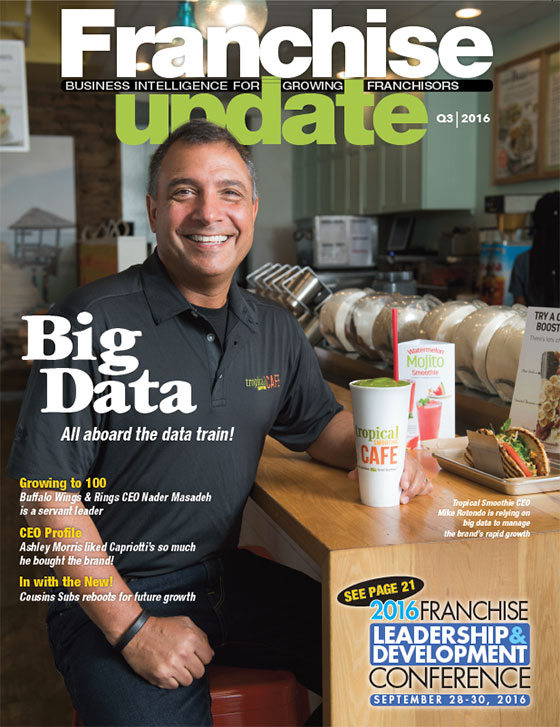Going Big: Big Data has Great Value--if You Know How to Use It

Big data: Extremely large data sets that may be analyzed computationally to reveal patterns, trends, and associations, especially relating to human behavior and interactions. (Oxford Dictionaries)
When Tropical Smoothie Cafe pondered an ingredient upgrade to a popular smoothie, the brand turned to data for direction. Using information culled from its recently launched app, the company surveyed customers who regularly ordered the smoothie and pulled together a blind taste test of 50 customers in its hometown of Atlanta. Within days, the franchisor was armed with enough insight to launch a test market of the tweaked drink, a menu move that previously would have taken weeks or months and often required hiring outside help.
Big data is changing the way franchise brands do business.
Franchisors large and small are making the dash to take advantage of the staggering amounts of increasingly accessible digital data to carry out strategic business moves, cut costs, and boost profits in all facets of their operations.
"The ability to have data at your fingertips to help make decisions has been a game changer for all industries, but specifically in franchising," says Tropical Smoothie CEO Mike Rotondo, who has implemented a myriad of big data initiatives to engage and reward customers and drive decisions designed for growth.
Whether through an internal system, third-party software, or both, franchisors are finding that tracking customers' digital and social media footprints can be a powerful ally in analyzing, predicting, and prescribing targeted marketing campaigns and strategies. POS and CRM systems, especially when coupled, offer franchisors the data they need to deliver personalized promotions, track trends, retain customers, boost traffic, and automate media buys. On the franchise development side, data is being used to predict the potential success of a franchisee, to make better site selections, and to improve operations, staffing, and franchise relations.
The brand's Tropical Rewards App, beta tested earlier this year and launched system-wide in June, unites mobile payments, digital ordering, and a loyalty program that includes gamification elements to allow customers to unlock perks and offers for its smoothies and food at the chain's 500 cafes. More important, the app (which at last count had a half a million downloads and 125,000 active users) brings together the brand's digital consumer programs and delivers data that provides invaluable insights into its customers' behavior. Over time, this will allow Tropical Smoothie to sunset its other digital communication methods to ensure a single data source.
Rotondo views the increasing reliance on data analytics as an evolution for his company. "We've done well. We've been lucky, made good decisions, and had good intuition," he says. However, he adds, "That is not scalable. It is not going to get this brand to 1,000 locations. What I have embraced, what I try to tell my team to embrace, and what I encourage other CEOs of small to mid-sized companies to consider, is that if you really want to scale, you have to embrace the concept that your intuition is going to get you only so far. You may know your business better than anyone else, but you must have data to support what it is you want to do."
Franchisors are finding that while it's one thing to collect and analyze data, it's what you do with it that matters. "The mistake people make is that they look at the data, but they haven't honed in on what is the question," says Rotondo. "Before you go get the data, make sure everyone is aligned on what the problem is you are trying to solve--what the question is you are trying to answer. Sometimes that is a step that gets missed."
Also, he says, with the rapid-fire development of new technologies, apps, and third parties offering "big data" solutions, brands are grappling with how to turn consumer information into actionable insights and avoid getting caught up in the analysis paralysis trap while the competition marches on.
Start making sense
Jersey Mike's Subs, with 1,500 locations open and under development, is in the process of consolidating the chain's reward, texting, online ordering, and email databases to create customer profiles and leverage powerful amounts of information and point-of-sale data. The brand's Shore Points Rewards program accounts for 30 percent of its customers and 33 percent of sales. The brand's email database tops 1.4 million, and the company recently wrapped up a two-month campaign designed to entice new and existing customers to create an online account in exchange for a free sandwich.
"Gathering the data is not so difficult," says Rich Hope, Jersey Mike's chief marketing officer. "Harnessing, making sense out of the data, and acting upon it in some way, in terms of marketing, becomes trickier. That is what we are doing now."
The move to bring together all the chain's digital sources will allow Jersey Mike's to know their customers more intimately and serve up offers based on their preferences, says Hope. The resulting database marketing is akin to a modern-day coupon, a strategy that appeals to franchisees.
"It's incredibly trackable and quantifiable," says Hope. "You can look at any single offer you do or any group of people you send to and analyze if it worked or didn't work, based on your benchmarks. It's analytically driven. Every single thing can be looked at and reviewed. That is the beauty of it."
While learning what and when they order is ultimately designed to better serve customers, collecting that information can be a headache that both franchisors and franchisees must be ready to handle, says Hope. "When you do something that involves technology, as simple as you try to make it, people aren't always going to get the process. So whenever you do anything like that, you better be ready on the customer relations side because there are going to be questions--and you need to be able to handle those questions."
Data for the system
While consumer marketing dominates headlines about big data and brands develop a deeper understanding of their customers' behaviors and preferences, franchisors also are finding a multitude of ways to use data to build a stronger system.
American Driveline Systems, parent company of Aamco Transmissions and Total Car Care, is using technology to transform all operational facets of the automotive service company. Chad Graham came on board last year as CIO to upgrade and fully integrate the brand's nearly 700 service centers in the U.S. and Canada. The result is two new initiatives: 1) a franchise relationship management (FRM) system, and 2) a new cloud-based POS shop management system, the company's first sales system change in 20 years.
The FRM system includes two web portals: one internal, for the franchisor to manage franchisee support; and a customer portal, which will give franchisees a dashboard window into how they stack up against their peers in areas such as revenue, expenses, and online reputation.
The company partnered with AutoZone's Alldata to develop the Aamco Management System, which will include new POS capabilities as well as shop management tools, including advanced scheduling and parts ordering. The new system will be rolled out chain-wide this year and be used to drive marketing decisions.
Graham says a key part of the company's transition to the new systems is the construction of a large data warehouse that will connect all currently available system data and fold in new information sources. "The secret in the sauce is the back-end data warehouse and information repository we are building," he says. "We can store bulk-level data that we have captured in the field from data partners, and from our sister business, Global Powertrain Systems, and use that information to better understand both the conditions in the field and our customers." Graham says capturing all this data will change the way the franchisor delivers valuable marketing and performance metrics to franchisees so they can take action based on that data.
Data from the company's developing FRM and POS-linked systems will give franchisees more and better information than they have ever seen before. "They will be able to see how their store is performing on leads, conversions, expenses, profitability, and growth in quite bit of grain and detail--trend data historically and compared to their peers. What they are going to have is great insight into their business to drive best practices," says Jim Gregory, CFO at American Driveline Systems.
"We win when the franchisees win," he says. "Our whole strategy is geared toward making the stores profitable. We firmly believe that is how we are going to make money and how our brand is going to grow."
Data for expansion
Terry Phillips joined Zips Dry Cleaners in 2015 as director of IT and analytics, charged with bringing together franchisee store information in a central location. At the time, the chain had 42 locations--on 42 different servers. While the data was structured identically at each location, a single report for all 42 stores did not exist. Phillips, who spent 29 years in manufacturing before joining Zips, plans to use a cloud-based system to consolidate franchisee data in a central repository by year-end, an increasingly vital task as the chain focuses on aggressive growth through large multi-unit franchisee agreements as it expands beyond its mid-Atlantic roots.
The regional chain, known for its same-day, one-low-price service, currently has 45 largely single-owned stores open and another 200 under development. In April, the brand signed an area development agreement for 110 locations in Southern California over the next 15 years, its largest deal to date.
Until the new system is in place, Phillips is sending individual store reports on customer retention, which already is reaping dividends for franchisees of the high-volume brand, where mature stores can serve as many as 15,000 customers.
"Our chain is very consistent across the stores," says Phillips. "The top 10 to 12 percent of customers on a store-by store basis spend 50 to 55 percent of the money, while the top 20 percent of customers spend 70 to 75 percent of the money. We want to show appreciation to those regular customers. We want to identify them and let them know their business is appreciated."
Phillips says the technology will provide valuable feedback to boost both customer service and franchisee operations. "Information is only worthwhile if it gets used," he says. "Once you start that process, you will get so much feedback. Most of it is about communicating the right information that can be put to effective use."
Data for franchisees
While big data is helping franchisors help franchisees target, predict, and influence customer choices and provide better service, analytics also can ensure that brands provide franchisees with the tools they need to succeed.
Tropical Smoothie has turned to third-party providers to track customer service satisfaction and to reduce waste. In July, the company announced its adoption of Jolt, a paperless restaurant operations system designed to streamline cafe operations and improve hospitality and crew member training to save franchisees time and money--as well as paper. The brand also uses detailed demographic and psychographic intelligence to pinpoint prime real estate locations and avoid encroachment. Tropical Smoothie "probably denies more locations than we approve based on encroachment of another franchisee," says Rotondo.
For franchisors, the task of what to do with the constantly increasing trove of data must remain centered on customer service (both consumers and franchisees), while investments in technology remain focused on ROI and tie in with overall marketing strategies. The ability to capture transactional, service, and social data--already plenty powerful--is only expected to gain traction and continue to grow in the world of franchising.
"The ability to analyze and effectively use that data will be the challenge going forward," says Jersey Mike's Hope. "The man hours, computer hours--it's a huge effort to crunch, understand, and effectively use it. While we are gathering data at a breakneck pace, we haven't scratched the surface on how it is used."
Share this Feature
Recommended Reading:
Comments:
comments powered by DisqusFRANCHISE TOPICS
- Multi-Unit Franchising
- Get Started in Franchising
- Growth
- Operations
- Open New Units
- Leadership
- Marketing
- Technology
- Legal
- Awards
- Rankings
- Trends
- Featured Franchise Stories
FEATURED IN

Franchise Update Magazine: Issue 3, 2016






 The franchise listed above are not related to or endorsed by Franchise Update or Franchise Update Media Group. We are not engaged in, supporting, or endorsing any specific franchise, business opportunity, company or individual. No statement in this site is to be construed as a recommendation. We encourage prospective franchise buyers to perform extensive due diligence when considering a franchise opportunity.
The franchise listed above are not related to or endorsed by Franchise Update or Franchise Update Media Group. We are not engaged in, supporting, or endorsing any specific franchise, business opportunity, company or individual. No statement in this site is to be construed as a recommendation. We encourage prospective franchise buyers to perform extensive due diligence when considering a franchise opportunity.